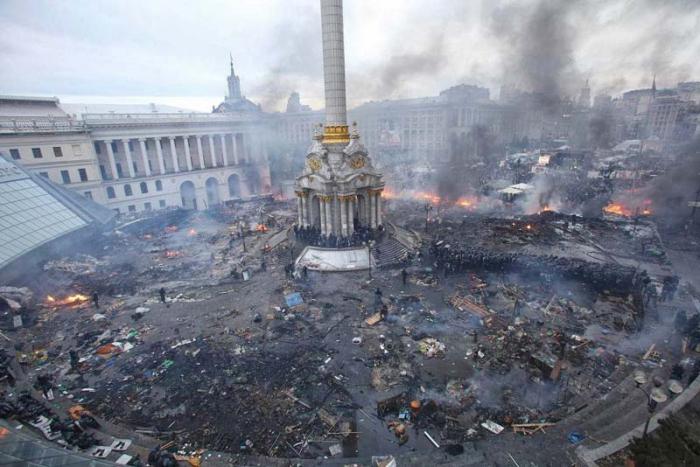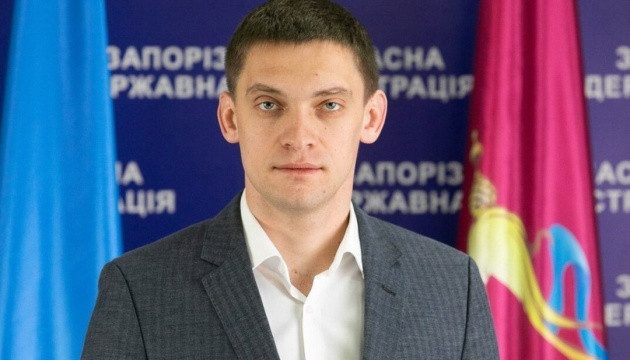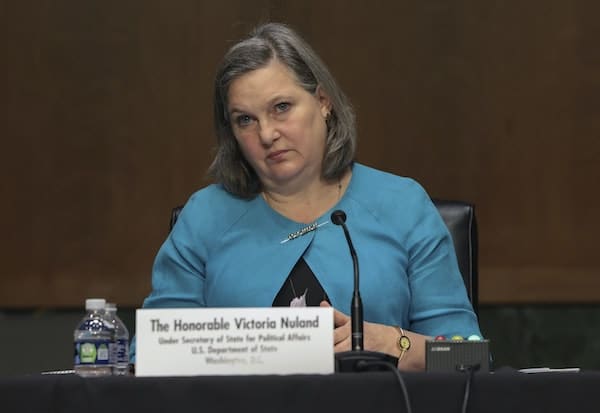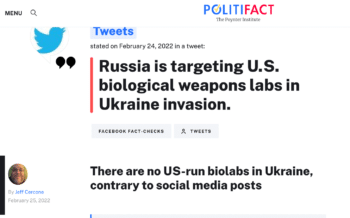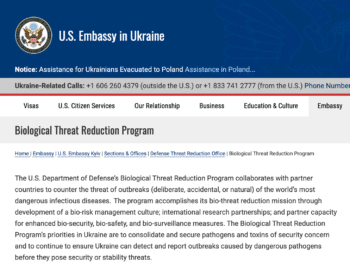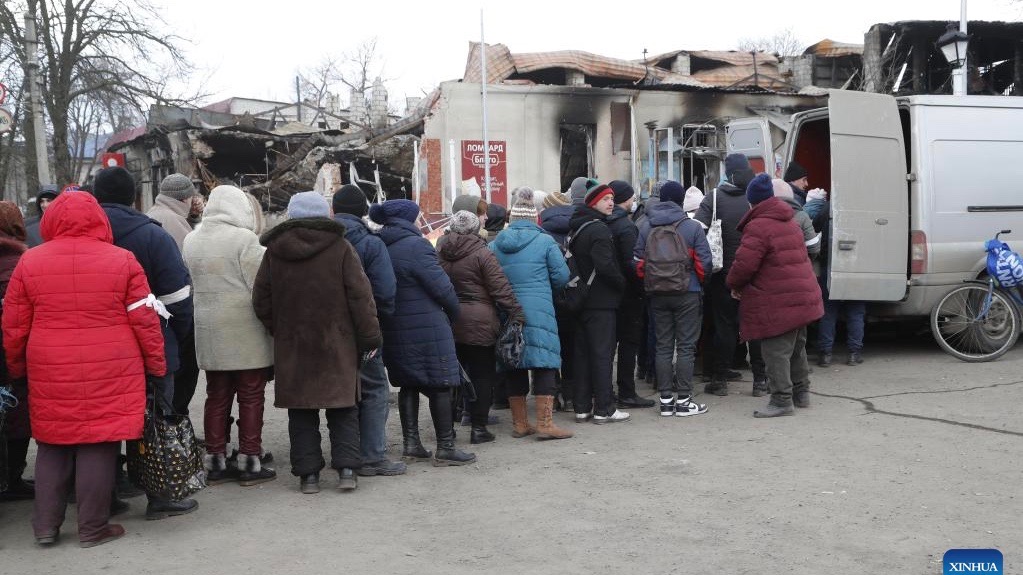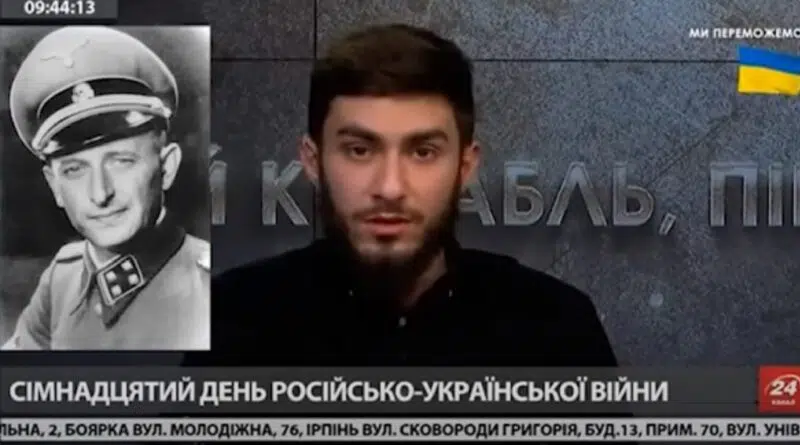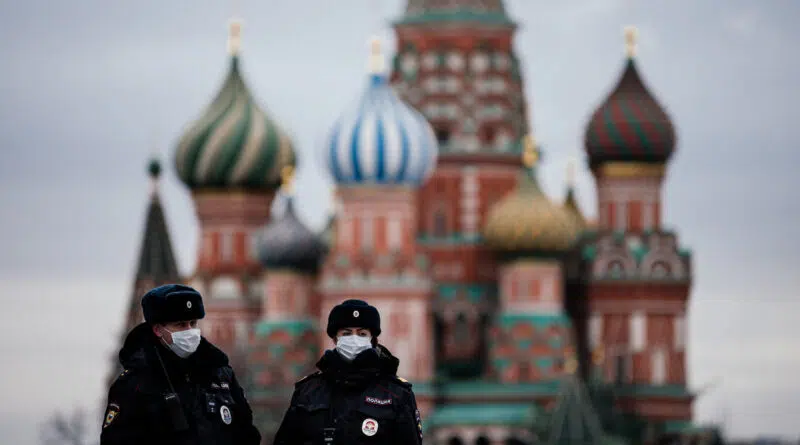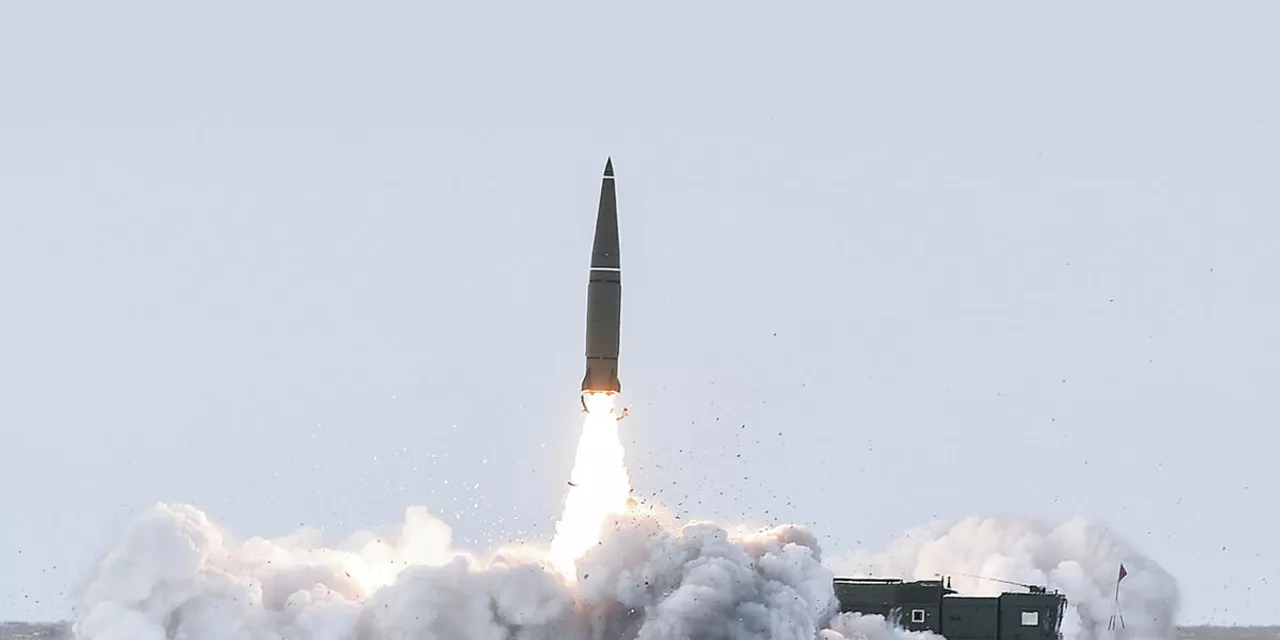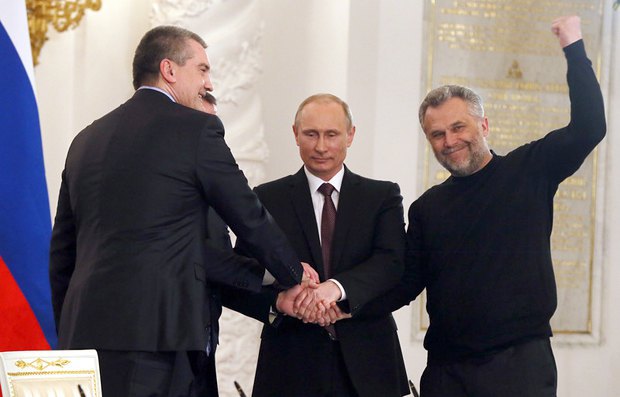LIVE: Zelensky Urges Negotiation

Local residents queue up to receive humanitarian aid in Volnovakha of Donetsk, March 15, 2022. | Photo: Victor/Xinhua)
Published 18 March 2022 (23 hours 20 minutes ago)
Rising prices or disrupted supply chains were reported by 60 percent of the companies surveyed, according to a recent survey.
The Russia-Ukraine conflict continues on Friday as relevant parties are working to broker a peaceful solution. Following are the latest developments of the situation:
Zelensky urges to negotiate and regain territorial integrity of Ukraine
Vladimir Zelensky advocated further negotiations with Russia and urged to regain Ukraine's territorial integrity in his daily message to the nation.
"The time has come to meet. The time has come to talk. The time has come to regain territorial integrity and justice for Ukraine," he said.
Halliburton announces it will cease operations in Russia
According to its website, U.S. oilfield services company Halliburton Co. announced it would immediately cease operations in Russia.
"The company is complying with sanctions prohibiting transactions and work, including for certain state-owned Russian clients. Halliburton will prioritize safety and security as it winds down its remaining operations in Russia," the statement said.
The company notes that it has no joint ventures in Russia. Shipments of parts and products to Russia were stopped by Halliburton several weeks ago.
"The war in Ukraine deeply saddens us. We have employees in both Ukraine and Russia, and the conflict greatly impacts our people, their families, and loved ones throughout the region," said Halliburton Chairman, President and CEO Jeff Miller. "Since the start of this conflict, we prioritized employee safety and compliance with all relevant sanctions."
Halliburton is the second-largest oilfield services company globally and the largest U.S. supplier of equipment to the oil industry. During its operations in Russia, the company has cooperated with all major subsoil users - Gazprom, Gazprom Neft, Rosneft, LUKOIL and others.
China opposes all biological weapons programs - UN envoy
China believes that under no circumstances should any country develop biological weapons, and opposes any research of this kind, Chinese Permanent Representative to the UN Zhang Jun has told the UN Security Council.
"China resolutely opposes the development, possession or use of biological and chemical weapons by any country under any circumstance," he told the UN Security Council meeting on the military biological research in Ukraine. ·
Apart from that, China urges all countries "to destroy their chemical weapons stockpiles as soon as possible."
The U.S. has not ruled out the possibility of imposing sanctions against China in case of worsening disagreements
The U.S. has not ruled out that it may consider imposing sanctions on China if differences between the countries worsen, White House press secretary Jen Psaki said Friday.
"A number of means of influence could be considered, certainly one of them is sanctions," Psaki said, responding to a reporter's question about whether Washington could impose sanctions against Beijing if their differences, including on trade, escalated.
Earlier Friday, U.S. President Joe Biden and Chinese President Xi Jinping had a phone conversation. During the conversation, the U.S. president explained, among other things, what the consequences of China's possible material assistance to Russia would be.
"He described what the consequences would be if China provided material support to Russia," according to a White House press release.
As noted, Biden and Xi Jinping paid special attention in their conversation to the situation in Ukraine. The U.S. and Chinese leaders also discussed the problem of Taiwan. The U.S. president reiterated that U.S. policy on Taiwan remains unchanged, adding that Washington "continues to oppose any unilateral change in the status quo.
Almost 14,000 people evacuated from Mariupol in the past day - Russian military
Over 13,700 people were evacuated from Mariupol in the past 24 hours, bringing the total number of evacuees to more than 56,700, Russian National Defense Control Center head Colonel General Mikhail Mizintsev said on Friday.
"The humanitarian operation in Mariupol continues. In the past day, <…> 13,751 people were evacuated from the city, the total number now stands at 56,743," he said.
The Russian defense official also said that despite serious difficulties, the Russian Armed Forces managed to ensure the operation of humanitarian corridors in the regions of Kiev, Kharkov and Zhitomir, declared by Ukraine. A total of 3,399 people managed to flee various localities in the area using buses and personal vehicles.
Burger King owners in Russia refuse to close restaurants due to sanctions
Owners of Burger King fast-food restaurants in Russia refused to leave the Russian market following the sanctions imposed against Moscow, according to RBI’s (Restaurant Brands International Inc., which owns Burger King) International President David Shear.
"We contacted the main operator of the business (in Russia - TASS) and demanded the suspension of Burger King restaurant operations in Russia. He has refused to do so," according to a statement by Shear posted on RBI’s website.
"There are no legal clauses that allow us to unilaterally change the (franchise) contract or allow any one of the partners to simply walk away or overturn the entire agreement," he explained.
"We started the process to dispose our ownership stake in the business. While we would like to do this immediately, it is clear that it will take some time to do so based on the terms of our existing joint venture agreement," Shear said.
RBI "suspended all corporate support for the Russian market, including operations, marketing, and supply chain support in addition to refusing approvals for new investment and expansion" in Russia, according to the statement.
Apart from VTB Capital, the Ukrainian financial group Investment Capital Ukraine (ICU) is part of the joint venture on the Russian market, Shear noted. Alexander Kolobov, the founder of Shokoladnitsa chain of coffee shops, control the operations of around 800 Burger King restaurants in Russia.
President Vladimir Putin held a phone conversation with German Chancellor Olaf Scholz. The Russian leader said that Moscow is ready to search for solutions to the Russia-Ukraine conflict during negotiations. Nevertheless, he criticized Kiev for "trying to delay the negotiation process in every way possible."
Putin also mentioned Russia's humanitarian work in Mariupol, and efforts carried out by Russian armed forces to save the lives of civilians by opening humanitarian corridors and evacuating people. Scholz called for a ceasefire, improvement in the humanitarian situation, and a diplomatic solution to the conflict as soon as possible.
German companies feel impact of Ukraine crisis. Seventy-eight percent of German companies feel the impact of the Ukraine crisis, according to a survey published by the Association of German Chambers of Commerce and Industry (DIHK) on Friday.
Rising prices or disrupted supply chains were reported by 60 percent of the companies surveyed, and 18 percent said they were directly affected through the loss of customers or suppliers. The survey was conducted among 3,700 companies. Across all industries, nine out of ten companies said that the rising costs of energy had a noticeable effect on their operations.
"This effect is reaching the entire economy with full force," said DIHK Managing Director Martin Wansleben. Even before the Ukraine crisis, around two-thirds of all German companies considered the increase in energy prices a risk to their development.
Two-thirds of the companies surveyed said that they had already responded to the cost pressure by passing on the price increases to customers. According to the Federal Statistical Office (Destatis), in 2021 the prices of energy products increased by 10.4 percent year-on-year in Germany after a 4.8-percent decrease in 2020.
Citibank accepts payment of Russian debt in dollars. Despite Western sanctions, Citibank received US$117.2 million in interests on Eurobonds that Russia was due to disburse on March 16. President Vladimir Putin's administration, however, specified that it could not guarantee that the final creditor would receive the payment.
"The possibility or impossibility of meeting our foreign currency obligations does not depend on us. We have the money and we have made the payment. Now the ball is in the court of the United States," Russian Finance Minister Anton Siluanov said.
Currently, the Russian government owes some US$40 billion in dollar- and euro-denominated bonds, half of which is held by foreign investors.
United Nations warns of increased risk of famine. The UN Rapporteur on the Right to Food, Michael Fakhri, warned that the Ukrainian conflict could increase famines globally. Given that Ukraine and Russia are among the world's top five cereal exporters, he warned that the conflict is already having consequences on the food supply in Egypt, Turkey, Bangladesh or Iran, which import over 60 percent of their wheat from these two countries.
The risk extends to other major importers such as Lebanon, Tunisia, Pakistan, or countries in conflict such as Yemen or Pakistan.
Over 3 million Ukrainians flee their country so far. The number of displaced persons caused by the conflict is still on the rise, bringing a huge impact on Ukraine and the surrounding countries. The United Nations launched a US$1.7 billion appeal to provide urgently needed assistance in Ukraine and to support refugees and neighboring countries hosting them.
Russia denounces that Ukraine is dragging out the negotiations. During a telephone conversation with German Chancellor Olaf Scholz, Russian President Vladimir Putin said that "the Kyev regime is trying by all means to drag out the negotiation process, putting forward new unrealistic proposals."
Lugansk troops control 90 percent of its territory. As the military operation in Ukraine enters its third week, the Russian Defense Ministry announced that troops from the self-proclaimed Lugansk People's Republic have already liberated over 90 percent of their territory, continue to advance north, and took control from the towns of Zolotaya Niva, Novodonetsky, Novomayorskoye, and Prechistovka. In Mariupol, units of the self-proclaimed Donetsk People's Republic reduce the siege and fight nationalists in the center of the city.
Since the conflict began on Feb. 24, Russia has destroyed 183 drones, 1,406 tanks and other armored fighting vehicles, 138 rocket launchers, 535 field artillery pieces, and 1,197 special military vehicles.
The Eurasian Economic Union (EEU) will gradually give up the dollar. This economic bloc will use the Ruble for its intra-regional transactions, according to Russian Economic Development Minister Maxim Reshetnikov. The EEU countries also agreed to analyze mechanisms to guarantee the stability of their domestic markets through measures affecting the export of some agricultural products outside the EEU territory.
"The EEU is the world's largest net exporter of agricultural products, and therefore we are not threatened by a shortage of basic products. The introduction of joint measures of non-tariff regulation will help stabilize domestic prices, which is especially important given the external situation," said Andrei Slepnew, the trade minister of the EEU Commission.
https://www.telesurenglish.net/news/LIV ... -0006.html
*****************************
Moscow – Kiev Talks Approach Positions on Ukraine’s Neutrality

Significant progress in Ukraine-Russia peace talks as 15-point plan to end war has been drawn up. | Photo: Twitter @BeatrizHLeon
Published 19 March 2022 (4 hours 5 minutes ago)
Representatives from both countries agreed this week that such an Austrian or Swedish demilitarized state arrangement could become a workable compromise, a light on the path of this difficult dialogue.
Russian presidential adviser Vladimir Medinski highlighted today that Ukraine's neutral status and its non-adherence to NATO are the issues on which both countries brought their positions closer together during bilateral talks.
However, the head of the Russian negotiating team warned there are nuances in the proposed agreements related to security guarantees that Ukraine would obtain in addition to the existing ones, in case it refuses to enter the North Atlantic Treaty Organization.
Representatives from both countries agreed this week that such an Austrian or Swedish demilitarized state arrangement could become a workable compromise, a light on the path of this difficult dialogue.
“We would like it to be an agreement for generations, so that our children also live in peace, this negotiation process is laying the foundation for it,” said Medinski, who clarified that Moscow’s conditions remain unchanged.
“We need a peaceful, free, independent, neutral Ukraine, not a member of military blocs, not a NATO member, a country that is our friend, a neighbor with whom we develop relations together, building our future,” he stressed.
He clarified that Moscow is against a Ukraine that is a springboard for military and economic attacks against Russia.
Ministerial delegations from both countries held three face-to-face meetings to find a solution to the bilateral conflict and a definitive end to the fighting. These meetings took place in different places in Belarus on February 28, March 3 and 7.
Then, on March 10, Russian and Ukrainian foreign ministers Sergei Lavrov and Dmitri Kuleba met in the Turkish city of Antalya.
A round in videoconference format began last Monday, interrupted that same day due to a “technical break”, as the parties described it, and continued until this Friday without knowing concrete results of the talks.
Russia began a military operation on Ukraine on February 24, after the authorities of the self-proclaimed people’s republics of Donetsk (DPR) and Lugansk (PRL) requested help to repel the increase in aggression from Kiev.
https://www.telesurenglish.net/news/Mos ... -0004.html
**********************************
Russia destroys a weapons depot in western Ukraine
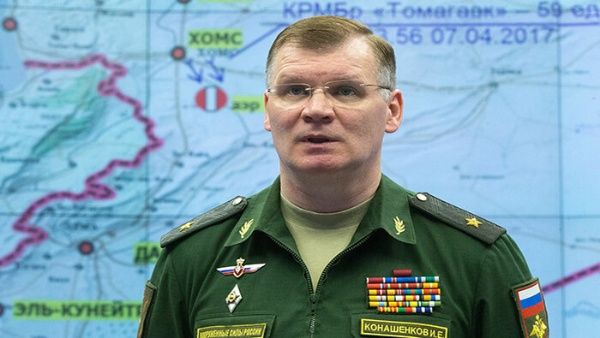
The Russian Defense Ministry indicated the use of Kinzhal hypersonic missiles to destroy the weapons warehouse in western Ukraine. | Photo: Sputnik novosti
Published March 19, 2022 (1 hour 54 minutes ago)
The spokesman for the Russian Defense Ministry indicated that 69 Ukrainian military objects were destroyed in the last 24 hours.
Russia claimed on Saturday that it destroyed an underground warehouse with weapons and aerial ammunition in western Ukraine.
The Russian Ministry of Defense indicated that Kinzhal hypersonic missiles were used in the military operation, being the first time that Moscow reports the use of this type of weapon during the military operation in the neighboring country.
The spokesman for the Russian Defense Ministry, Igor Konashénkov, indicated that the military installation was located in the Ukrainian region of Ivanko-Frankovsk.
According to the Russian military, 69 Ukrainian military objects were destroyed in the last 24 hours, including four command posts, four anti-aircraft systems, a target detection and designation radar station, three multiple rocket launcher systems, 12 weapons and ammunition depots and 43 military equipment concentration points.
Igor Konashenkov said that a total of 196 drones, 1,438 tanks and other armored vehicles, 145 multiple rocket launchers, 556 field artillery pieces and mortars, and 1,237 special military vehicles have been destroyed since the start of the special military operation.
Russian President Vladimir Putin reiterated on Friday that the special military operation in Donbas has as its main objective to free its inhabitants from the suffering and genocide they have experienced in recent years.
"The main objective and reason for the military operation that we launched in Donbas and Ukraine is to relieve these people from suffering, from this genocide (...) And we are seeing how heroically our military are fighting during this operation," said the Russian president. .
https://www.telesurtv.net/news/rusia-de ... -0008.html
Google Translator
**************************************
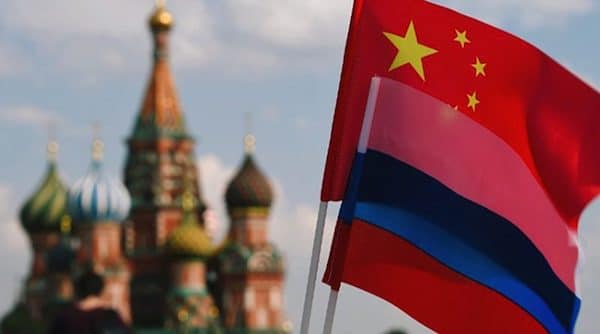 Contexto Chino: What do Chinese citizens say about Ukraine?
Contexto Chino: What do Chinese citizens say about Ukraine?
Originally published: Kawsachun News by Kawsachun News (March 16, 2022 ) | - Posted Mar 19, 2022
Culture, Empire, Ideology, MediaChina, Russia, UkraineInterviewMaria Fe Celi
Contexto Chino is our bi-weekly column where we interview Maria Fe Celi, Peruvian political analyst in Shanghai, to discuss Chinese culture and current affairs from a Latin American perspective. For this edition, we discuss how the Russia-Ukraine conflict has been talked about by both citizens and the government in China.
Kawsachun News: The conflict in Ukraine has been raging for three weeks now, how have the Chinese government and people been responding to these developments?
Maria Fe Celi: Chinese people and the Chinese government are two different things on this issue. Among Chinese people there’s been huge energetic support for Russia, there was even a movement among people to buy all the Russian products from online shops in China and everything sold out very quickly.
People have been bringing up the NATO bombing of the Chinese Embassy during the war in Yugoslavia (3 dead, 20 injured). The United States said it was a mistake, but Chinese people never forgave NATO for that. There is also a belief that if Russia is sanctioned today then it could happen to China tomorrow, so people believe they should support Russia now.
However, the government has been sticking to its long-held foreign policy and maintained its neutrality, but that doesn’t mean that it’s been ignoring the issue. China always supports upholding the territorial integrity of countries. As they built good relations with Russia, they never recognized Crimea as Russian, China still recognizes it as part of Ukraine. The Chinese government has also been vocal about recognizing the legitimacy of Russia’s security concerns. China has always opposed the escalation of armed conflict and that’s why they voted neutral at the UN on the question of the Ukraine conflict. They oppose the use of military intervention and also the use of sanctions. This has been China’s position with regard to every conflict that has come before this too.
China, while maintaining its neutrality, has emphasized that the principal motivation for the crisis is NATO expansionism and its inability to recognize the legitimacy of Russia’s demands. This is a much more nuanced position than that taken in the West where they just say ‘Putin is crazy’ and ‘he wants to invade the whole of Europe’.
China has also been denouncing the biolabs in Ukraine where it seems that the U.S. has been developing biological weapons. Since the start of the pandemic, China has suspected that the origin of the virus could be in the U.S. military lab in Fort Detrick. They’ve always insisted that Fort Detrick should be investigated just as Wuhan was. The U.S. has recognized that these labs in Ukraine exist, but say that they’re not for biological weapons.
Xi Jinping has been speaking to France and Germany and has tried to get them to take a bigger role in achieving a peaceful solution because after all, Europe is the most affected by this conflict. China is emerging as the ideal candidate to broker a solution to this conflict, but we don’t know what will happen.
KN: Russia is mass adopting China’s UnionPay after Visa and Mastercard pulled out. What is UnionPay and can it be sanctioned?
MFC: UnionPay is a payment system used for credit and debit cards, basically the Chinese version of Visa. However, in China, most people pay for everything electronically on WeChat and Alipay, so maybe Russia can now be the best growth market for them. UnionPay was already present in Russia and its cards are accepted by most ATMs there and around the world, so the transition is not difficult, and it means the Russian banking system won’t just collapse. The sanctions have also left the Russian market open for Chinese consumer goods now that Western companies have pulled out. For the Chinese companies that don’t have business in the U.S., this is a huge opportunity for them to move in and scoop up the Russian market. This will also help accelerate the de-dollarization of the global economy, and for this transition period, China is well-placed to help fill the gaps while Russia develops its own self-sufficiency, which Lavrov says is their aim.
KN: Has the Ukraine conflict changed Chinese discussions about Taiwan?
MFC: At the beginning of the conflict, a lot of Taiwan separatists were mobilizing to express support for Ukraine and this generated a lot of mockery on social media even within Taiwan. Remember that only a minority of Taiwanese people want independence, the majority support the status quo as long as they continue to benefit it from it. Most Taiwanese people know that separating from China would be an economic catastrophe for them. People there are still culturally Chinese, and it’s a very pragmatic society, so they have no desire to separate. Taiwan’s elites don’t want that either. The attempts to make comparisons between Ukraine and Taiwan haven’t been successful for anything other than generating a few joking memes, people aren’t comparing the two issues.
https://mronline.org/2022/03/19/context ... t-ukraine/
*************************************
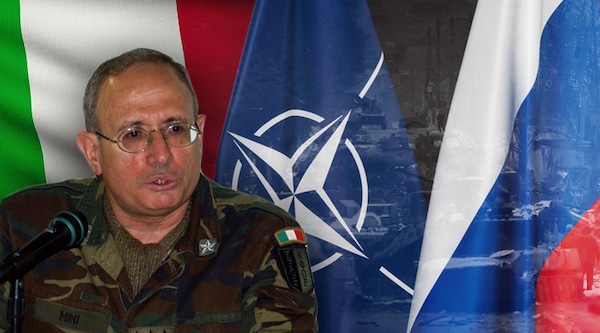
Italian Lieutenant General Fabio Mini, General of the Corps of the Italian Army and former Chief of Staff of NATO’s Southern Command
War in Ukraine: Dispatch of weapons and propaganda
Originally published: United World by l’AntiDiplomatico (March 12, 2022 ) | - Posted Mar 18, 2022
The following interview with the Italian Lieutenant General Fabio Mini, General of the Corps of the Italian Army and former Chief of Staff of NATO’s Southern Command, was first published by l’AntiDiplomatico.it. The original interview can be read here.
Translation was provided by l’AntiDiplomatico, with editing from United World International. Subheadings were set by UWI.
Italian Lieutenant General Fabio Mini: “Negotiate, stop being only focused only on one thought and on propaganda, help Ukraine to coming to her senses and provide Russia a chance to get out of the tunnel of the encirclement syndrome–not with plain talks but with concrete acts”.
This is the thought of Fabio Mini, Lieutenant General of Corps of the Italian Army, former Chief of Staff of the NATO Command of Southern Europe and commander of the international mission in Kosovo. “And when the crisis is overcome, hoping to be still alive then, Italy and Europe will have to make a serious commitment to conquer that autonomy, dignity and strategic independence that guarantees European security regardless of the interests of others”, states Mini to l’AntiDiplomatico.
It has been correctly written that generals are the most sensible voices in a landscape of one-sided propaganda, as they know well how to weigh words at times like these. As L’AntiDiplomatico, we had the honor of being able to interview one of the most authoritative of them.
l’AntiDiplomatico: From the Gulf of Tonkin to weapons of mass destruction in Iraq–and even going back a long way in history–you have brilliantly reconstructed in your book “Why are we so hypocritical about war?” the forgeries that have determined the pretext for the outbreak of several wars. What is the hypocrisy and falsehood behind the ongoing conflict in Ukraine?
FM: The false claim is that the war began with the Russian invasion of Ukraine. In reality, this invasion is not even the final act of a war between Russia and Ukraine, a war that began in 2014 with the insurrection of the provinces of Donbass, which later declared independence. Since then, Ukrainian forces have battered the Russian-speaking population on the verge of the massacre and no one has said anything. For that population in revolt against the Ukrainian regime, the expression ‘war of liberation’ or self-determination, so dear to some international observers, was not even used.
It was sufficient for them to state that “Putin’s Russia” wanted to return to the tsarist empire–and the issue was settled. Hypocrisy is the attitude of pro-Ukrainian Western propaganda, which, recognizing that there is a war, pretends not to know who and what caused it. Instead, that propaganda is surprised that someone shoots, someone else dies and many are forced to flee. The hypocrisy even more serious than the propaganda is the conspiratorial silence of those who disregard the fact that since 2014, the United States and NATO have poured billions in aid almost entirely destined to arm Ukraine and thousands of war professionals. Extremist groups and neo-Nazis were trained and enriched.
“NATO’s deliberate goal was to turn Ukraine into an outpost against Russia”
l’AntiDiplomatico: In the Western press, Putin tends to be defined as “a madman who shocked the world with his initiative”. Yet in a 1997 video, the current U.S. President Biden declared that NATO’s enlargement to the Baltic countries (not Ukraine!) would be able to cause a military response from Russia. Do you think that since 2014 Europe has underestimated the Ukrainian question?
FM: I don’t think it was underestimated. On the contrary, it was a deliberate goal to gradually transform the country into an outpost against Russia, regardless of its admission to NATO. Hence the so-called ‘orange revolution’ (2004), the internal and external sabotage of every attempt at stabilization, the alternation of corrupt governments, the pseudo revolt of Euromaidan, the coup against President Yanukovich (2014) and the election of Zelensky.
The latter has began with an electoral program opposing the oligarchs, political corruption and the promise of “serving the people” and ended at an openly provocative policy towards Russia. And this was exactly what the United States and the NATO wanted since 1997.
l’AntiDiplomatico: The topic of the NATO expansion, however, has always been taboo for us.
FM: NATO’s expansion to the east began in the year when a series of steps to involve the Eastern European countries in “military cooperation” (the “Partnership for peace” program) were undertaken, and it has been a constant provocation for 24 years.
For over a decade Russia was unable to oppose it. NATO, urged in particular by Great Britain, Poland and the Baltic republics, thought it could close the circle around it by “activating” both Georgia and Ukraine.
Russia intervened militarily in Georgia and this gave a strong signal to the U.S. and NATO, which did not want to participate in that war.
During the Syrian crisis of 2011, Russia sided with the government of Bashar Assad and subsequently intervened militarily with the war against ISIS, making a substantial contribution to the group’s neutralization. Bashar Assad is still there. The Russian operations in Syria, although agreed and coordinated on the ground with the American-led coalition, have disturbed the plans of those who wanted to take advantage of ISIS and related gangs to destabilize the entire Middle East.
Another sign of the changed Russian mood was the annexation of Crimea immediately after the coup against Yanukovic–a coup supported by the United States and in particular by the envoy of the State Department Victoria Nuland and by then Vice President Biden.
From 2014 onwards, Ukraine–with the support of the United States and NATO–followed an even more hostile line towards Russia and began to integrate neo-Nazi groups that had “proven themselves” in the Maidan clashes into the armed forces and the police. The very same people are now organizing the “Ukrainian resistance” and coordinating the approximately 16,000 mercenaries scattered across the country.
“NATO pushed Ukraine into an adventure”
FM: For all of this, I would like to say that NATO has not neglected Ukraine, on the contrary, it has strongly pushed it into an adventure that is dangerous for both all of us and especially for the Europeans.
l’AntiDiplomatico: In a recent TV appearance, you said you got to know Russian generals firsthand and called the Russian operation “a limited war for limited purposes”. What are the objectives that the Russians have set themselves in Ukraine in your opinion?
FM: In Kosovo I was also supported by the Russian contingent, a part of which guaranteed the security of the military / civilian airport of Pristina, while another part was deployed in the mountain sector on the border with Serbia. I had almost daily contact with the Russian generals, who were always very correct especially towards me (as an Italian).
We were talking about collective security and the future of Kosovo, something that no one in NATO had thought about before going to war. We also talked about military operations and doctrine. Twenty years ago.
Limited warfare is a category also foreseen by Clausewitz and the Russians have always been Clausewitzians.
At the beginning of the invasion I began to see the signs not of a special operation as Putin called it, but of a series of operations with limited objectives, united by the strategic purpose of preventing Ukraine from becoming the epicenter of a military threat to Russia, but tactically independent.
The operations concerned the securing of territories in the Donbass, the coastal strip of the Azov Sea and the Black Sea up to Odessa and, if necessary, up to the border with neutral Moldova. The advance on Kiev was to be mainly a political operation of pressure for negotiations and the eventual establishment of a government favoring the Russian position.
“Russian operation is not limited in time or objectives–its path depends on the unfolding events”
FM: This operation is not limited either in time or objectives: it depends on the unfolding events. If the diplomatic, political and operational events evolve satisfactorily, the operation can be stopped. Otherwise, marching in forces can move to be deployed around the city, and if the events are still negative, they can move on to the “preparation” of fire, then to the aerial fire and then, if and when the city is exhausted, they can start the real grip on the city.
This type of artichoke operation has blown away all improvised analysts who expected and perhaps cynically wished to see the firestorm Americans have accustomed us to in all their wars.
Obviously this operation modus fueled speculations about the effective power of the Russian apparatus and the heroic Ukrainian resistance, which would have halted the invasion.
The military apparatus we see on television, however, tells something different: the operation is still intentionally in the first phase, awaiting events. In this situation, the advantages come only from the effectiveness and credibility of pressure. The disadvantages concern both external provocations (by NATO) and the strengthening of internal resistance, which will not change the result of the operation but would do much more damage.
Risk of moving from tactical to strategic forces and direct confrontation between NATO and Russia
l’AntiDiplomatico: Do you think that the weapons that Italy will send and the mercenaries that are arriving will have an impact on the fate of the conflict? Will this step not cause further risks?
FM: I really do not think so. They will make it bloodier and lift the war on an even higher operational level. In the event of an imbalance of tactical forces, there is a tendency to move to the strategic one. Then weapons of strategic level such as bombers, missiles and even tactical nuclear weapons can be used: all kind of things that would lead to a direct confrontation between NATO and Russia.
l’AntiDiplomatico: Do you think there is a danger that mercenary jihadists could flow from Syria to Ukraine in large numbers? And what complications would be created in the conflict?
FM: Mercenary jihadists will be few in Ukraine. They will be able to influence the level of barbarism, in the sense of increasing it. There are many mercenaries and they are also well paid. We pay those who are fighting for Ukraine with our money, and Russia pays those who are fighting for Russia with Russian money.
However, the influx of mercenaries has an interesting aspect: it completely dismantles the thesis people voluntarily fighting for their homeland. Furthermore, companies of mercenaries or contractors are never satisfied with simple pay for soldiers. They always demand greater things from the states that hire them. They also want power, important national assets such as mines, industries and sensitive infrastructures. They are never satisfied. Kingdoms have fallen due to dissatisfied mercenaries.
“Russia’s requests are the basis of discussion”
l’AntiDiplomatico: On the negotiations in Belarus: France and Germany seem to be oriented towards a more mediation approach while our country, absent from the Franco-German-Chinese summit, seems to prefer a more extremist vision. Do you consider Russia’s requests a valid starting point for Europe and what is the risk of waiting longer in terms of a real confrontation?
FM: Russian requests, as in any negotiation, are the basis of a discussion. If they are not satisfying, if there is no consensus, then each party must stop saying what it wants and start thinking about what it can give.
In general, the strongest party is the one most willing to give in, because it believes that it is “conceding” and therefore keeps the prestige intact. The weaker party only needs to reduce the level of ambition. In this case, every slightest reduction in Ukrainian ambition would lead to a great concession: the salvation of the country.
Our country unilaterally decreed, as if speaking for everyone, the end of negotiations, among other things with a bullying attitude. The attitude of others is much less arrogant. And this makes them play the tune. But even in bullying, we are not among the best. Great Britain and Poland beat us.
No Fly zone would accelerate desaster
l’AntiDiplomatico: The Polish government has declared its intention to supply MiGs to the Ukrainian forces, but sending them from the German bases. The United States then held back the Polish initiative. How real is the option of a No fly zone in Ukraine and how likely is a future NATO military involvement?
FM: The declaring the Ukrainian skies a No fly zone would be a way to accelerate the disaster. Those who are clamoring for it want this disaster and demonstrate their inability to control their airspace. They want a pretext to drag all of Europe into the war. We must not give in to this perverse temptation, especially in moments like these when an air attack ends up hitting a hospital pavilion and emotion suffocates rationality.
Ukrainian army had opposed the introduction of radical elements into its ranks
l’AntiDiplomatico: Western narration today tries to minimize (or completely censor) the presence of neo-Nazis in the battalions incorporated into the Ukrainian forces, despite dozens of reports (from the BBC to Time to the Guardian), which in the past had shed light on the affair with justly horrified tones. Do you think Putin is credible when he announces as one of his goals the de-nazification of Ukraine?
FM: The de-nazification, to which Putin refers, does not concern Ukraine, but its government apparatus, where these elements are at the top. The press reports are all correct and in any case do not give an exact account of the presence and influence of these groups.
It was precisely the Ukrainian police and intelligence forces that opposed the inclusion of these elements into their ranks. They had to suffer but today, the hunt for the Russian (or pro-Russian) can change into a hunt for the Nazi. And given the numbers and the frenzy of the interested parties, I would not be surprised if tomorrow Ukraine falls from the pan of the war against Russia into the embers of a civil war.
l’AntiDiplomatico: What should the Italian government do in this context and Europe more generally?
FM: Negotiate, stop being only focused only on one thought and on propaganda, help Ukraine to coming to her senses and provide Russia a chance to get out of the tunnel of the encirclement syndrome–not with plain talks but with concrete acts. And when the crisis is overcome, hoping to still be alive, Italy and Europe will have to make a serious commitment to conquer that autonomy, dignity and strategic independence that guarantees European security regardless of the interests of others.
https://mronline.org/2022/03/18/war-in-ukraine/
********************************
Who are the foreign fighters traveling to Ukraine? What we know and what we don’t
Many worry that the influx of allegedly 20,000 foreign fighters into Ukraine could exacerbate existing problems with far-right insurgency worldwide
March 18, 2022 by Natalia Marques
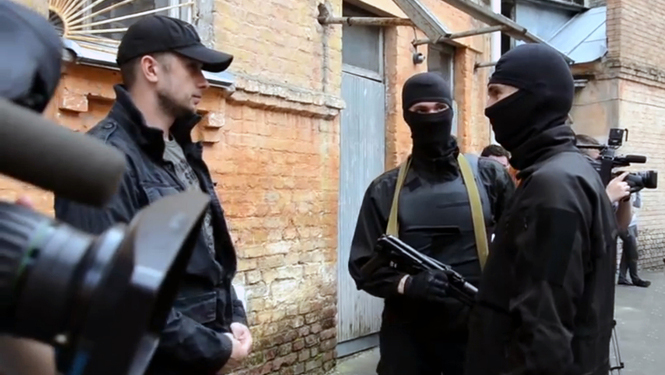
Caption: Azov Battalion volunteers. Azov has been successful at recruiting fighters from the Western far-right movement
“Remember, the Russians invaded Afghanistan back in 1980,” said former US Secretary of State Hillary Clinton shortly after the February Russian offensive in Ukraine. “It didn’t end well for the Russians.” she explained. “There were other unintended consequences as we know, but the fact is, that a very motivated, and then funded, and armed insurgency basically drove the Russians out of Afghanistan.” [emphasis added]
The “unintended consequences” Clinton referred to were the arming and funding of the mujahideen fighters, who eventually became the ultra-violent groups Al-Qaeda and the Taliban, who have terrorized and continue to terrorize both the people of Afghanistan and the US.
What Clinton hinted at, that the infamous Western tactic of using well-funded insurgents could win the war against Russia in Ukraine’s favor, has many worried about the potential fallout. Could Ukraine become the far-right’s Afghanistan, in which Neo-Nazi forces are able to use the war against Russia as a combat training ground?
These concerns are not misplaced. In Ukraine, far-right insurgent groups have gained considerable power since the 2014 Maidan coup, in which fascists took power and toppled a democratically-elected president. Ukraine already has a precedent of attracting ultra-right groups and individuals from other countries, who have sought to use existing political instability to gain combat experience.
Ukrainian government officials, as high-ranking as President Zelenskyy himself, have in the last month specifically asked for foreign fighters to join Ukraine in the war against Russia. According to Ukrainian Foreign Minister Dmytro Kuleba, 20,000 people from 52 countries have already volunteered to fight in Ukraine. Who are these volunteers? And what will be the consequence of this influx of foreign combatants, with differing or unclear motives?
A disturbing precedent
Foreign fighters have come in and out of Ukraine since the 2014 Euromaidan coup, led by ultra-right wing forces and backed by the US, which overthrew democratically-elected President Viktor Yanukovych. Many of these fighters were indeed right-wing extremists. Post-2014, the US Department of Justice opened up an investigation into several people from the US who went abroad to fight in Ukraine with ultra-right volunteer forces, and allegedly committed war crimes. The investigation centers around veteran US soldier Craig Lang, who traveled to Ukraine in May 2015 and fought alongside Ukrainian far-right battalions such as Right Sector. Lang had a history of violence: even before flying to Ukraine he was jailed after traveling across the US with the intention of murdering his pregnant wife. When he returned to the US from Ukraine, Lang, along with an accomplice, killed and robbed two people in a Florida robbery in order to fund more international right-wing exploits. These included a plan to travel to Venezuela to fight the democratically-elected socialist government.
Since 2014 and before the war started, over 17,000 foreign fighters have come to Ukraine from over 50 countries. Ultra-right groups such as the Azov Battalion, since incorporated into the Ukrainian National Guard post-Euromaidan, have been extremely effective at recruiting foreign fighters. Citizens of Germany, the UK, Brazil, Sweden, the United States, and Australia have traveled to Ukraine in order to join Azov. The Battalion maintains a “western outreach office”, which travels around Europe to promote its white supremacist views, and targets specifically right wing groups and individuals around the world. As the Soufan Center reports, “in July 2018, German-language fliers were distributed among the visitors at a right-wing rock festival in Thuringia, inviting them to be part of the Azov battalion: ‘join the ranks of the best’ to ‘save Europe from extinction.’”
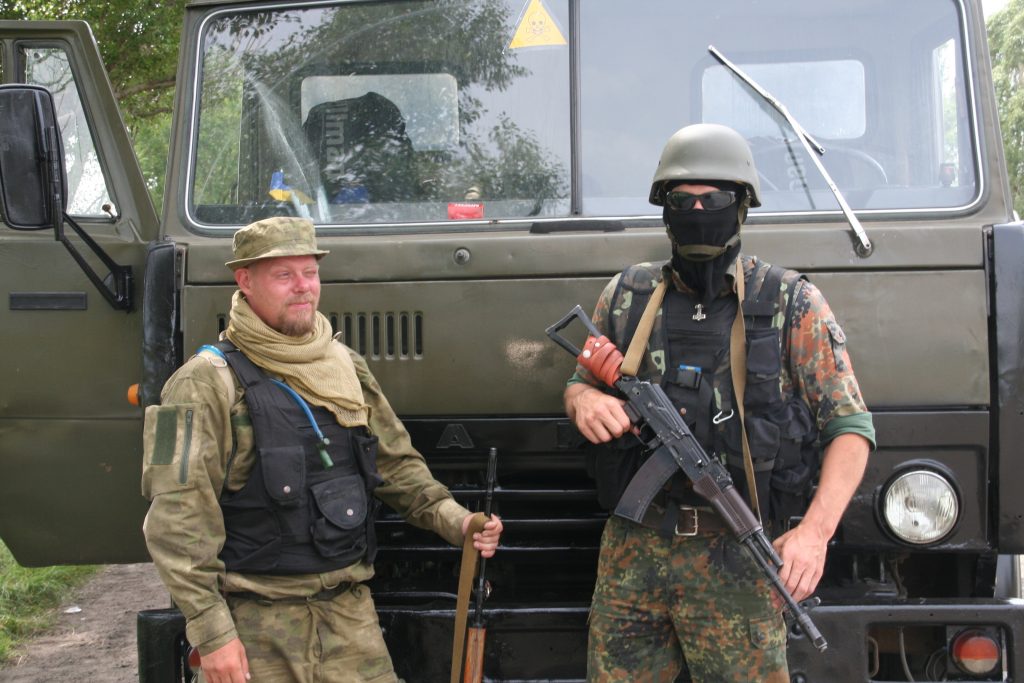
Mikael Skillt (left) and “Mikola” (right), Swedish volunteers in the Azov Battalion. (Photo: Carl Ridderstråle)
The influence of neo-Nazis and the ultra-right has waned since Euromaidan. In 2019, the far-right suffered a humiliating defeat by winning only 2% of the vote in parliamentary elections. Yet, fascists maintain a significant hold on the military and police forces in Ukraine. As long as heavily armed Neo-Nazi groups like the Right Sector and the Azov Battalion continue to recruit amongst the worldwide right-wing and pull in disgruntled and violent individuals, the fascist movement will promulgate in Ukraine and in the rest of the world.
Are extremists traveling to fight in Ukraine?
Since the Russian invasion, foreign volunteers have poured into Ukraine in startling numbers. If the 20,000 claim by Ukrainian officials is to be believed, are a significant portion of these fighters right-wing extremists, or could they turn to the ultra-right while fighting alongside the likes of Azov?
Kacper Rekawek, a fellow at the Center for Research on Extremism at the University of Oslo who has studied foreign fighters in Ukraine since 2014, believes the answer so far is no. He told Slate, “All the people who go say one thing: ‘I’m here for humanitarian reasons’…Unlike in 2014, they don’t appear to be motivated, as a group, by a certain set of ideological tropes.”
It is too early to tell definitively how many foreign fighters traveling to Ukraine have ultra-right connections or sympathies. But contrary to what Rekawek claims, there are already concerning patterns emerging: According to the SITE Intelligence Group, which is tracking extremist activity surrounding the Russia–Ukraine war, Neo-Nazis in Germany and the US are urging others to fight and donate to Azov. Far-right groups are expressing an outpouring of support for Ukraine, and seeking to physically join the fight against Russia, who they view as communists despite the 30 plus years that have elapsed since the dissolution of the Soviet Union.
Most recently, Henry Hoeft, from Ohio, was profiled sympathetically in the Columbus Dispatch, which later had to revise the article to add that Hoeft had been a member of the far-right and heavily armed US group the Boogaloo Bois. Hoeft later made more news when he published a video detailing his experiences in the war, claiming that Ukrainian officials were understating the amount of foreign fighters who had died, sending foreigners to the front with no weapons, and cutting up foreign passports.
The Azov threat
The Azov Battalion remains a central presence in the current war. This raises concerns that the tens of thousands of foreign fighters could be radicalized by groups like Azov. Azov is beloved throughout the world’s extreme right, with its symbols seen at a US Neo-Nazi rally and the motorcycle of a father and son duo who attempted to blow up a mosque in Italy. And in terms of their influence among potential foreign fighters, the director of the SITE Intelligence group writes, “Not since ISIS have we seen such a flurry of recruitment activity.”
Recently, Azov released of video of its members coating their bullets in pork fat, to be used to shoot Muslim Chechen soldiers. Azov is now the primary force defending Mariupol, a city that has made headlines all over Western media for its centrality in the war at the moment. The US, which has committed numerous war crimes of its own, has accused Russia of war crimes for its alleged bombing of the Mariupol Theater. However, conflicting reports, such as an AP article that claims there are no reported casualties, indicate a possibility that Azov bombed the theater themselves in order to gain more Western support.
—
With the likes Azov, European Neo-Nazis, and the Boogaloo Bois in the mix, there is reason to be concerns about foreign fighters returning home radicalized to the far right and/or with dangerous combat experience. However, with the war only a few weeks old, the issue of foreign fighters raises numerous other questions that cannot be answered as of yet. The sheer number of foreign fighters—20,000—is remarkable in itself. Can all these fighters be merely a ragtag mix of volunteers? Or does this indicate a coordinated effort by right-wing recruiters as SITE indicates? Or perhaps this hints at a hidden, larger effort by mercenary companies like Blackwater, who before the war had plans to create a $10 billion private army in Ukraine?
The situation on the ground for foreign fighters is pure chaos. A returned British soldier, fighting on the side of Ukraine, claims he was tortured by Ukrainian guards. A recent Russian strike killed an estimated 200 foreign combatants. Russia has announced that it intends to treat foreign fighters as mercenaries rather than lawful combatants, and the US has urged its citizens not to go fight. In fact, a 2019 study found that when foreign fighters deploy, violence against civilians goes up.
For foreign fighters, whether they are radicalized by the ultra-right or killed in the crossfire, the outlook is grim, highlighting the need for a peaceful resolution to the conflict.
https://peoplesdispatch.org/2022/03/18/ ... t-we-dont/
**********************************
NATO, not China, is to blame for the Ukraine crisis
March 18, 2022 Global Times

The Ukraine crisis was largely triggered by NATO’s aggressive eastward expansion. The bloc is the culprit. Instead of reflecting on itself, NATO piles pressure on other countries to stand with it against Russia. This is unreasonable and quite sinister.
“China should join the rest of the world in condemning strongly the brutal invasion of Ukraine by Russia,” NATO Secretary General Jens Stoltenberg said on Tuesday, “The Russian invasion of Ukraine is a blatant violation of international law so we call on [China] to clearly condemn the invasion and of course not support Russia. And we are closely monitoring any signs of support from China to Russia.”
NATO is a puppet of the US, a Cold War military bloc manipulated by the US. The obsolete military organization has launched many ruthless military aggressions and triggered corresponding disasters in which local people underwent great suffering. NATO’s aerial bombing campaign against the Federal Republic of Yugoslavia in 1999 during the Kosovo War is one example.
NATO’s hands are stained with blood and the bloc itself has been a major threat to global and local security. Is NATO qualified to criticize other countries? This organization should have been dismantled long ago.
“NATO is the most serious war machine that violates international law and endangers the sovereignty and territorial integrity of other countries since the end of the Cold War. Since when has the group become a defender of international law? If it is a defender of international law, could you please first apologize for their bombing of Yugoslavia? Could you first compensate for bombing the Chinese Embassy in Yugoslavia in 1999, which left three journalists dead, and more than 20 people injured? Stoltenberg is not qualified and has no right or moral basis to make such remarks,” Shen Yi, a professor at the School of International Relations and Public Affairs of Fudan University, told the Global Times.
The West has fallen into extreme insanity, and this is quite sick. This is also a symptom of the growing abnormality of the international community under the coercion of the US and its allies. Stoltenberg’s rhetoric sounds like he attempted to label China as Russia’s “accomplice.” In terms of tensions between Russia and Ukraine, there is no absolute right and wrong, as the geopolitics, history and culture between them are too complicated. Their tensions are a difficult problem to solve. In this context, portraying their military conflict as good versus evil is not rational and detrimental to address it.
The Chinese ambassador to US Qin Gang said in an opinion piece in The Washington Post that rumors like “Russia was seeking military assistance from China” are “purely disinformation.” All this is information war initiated by the US. NATO is trying to use this kind of information war to intimidate China, and to coordinate Washington, in an attempt to occupy the moral high ground over the Ukraine crisis.
“By making such statements, NATO is trying to distort the focus of the international community from criticizing its eastward expansion to China’s so-called coordination with Russia,” Zhang Tengjun, Deputy Director of the Department for Asia-Pacific Studies at the China Institute of International Studies, said. “NATO is deliberately circumventing its role and responsibility. It is trying to shift the blame and confuse the public. This is very sinister.”
Source: Friends of Socialist China
https://www.struggle-la-lucha.org/2022/ ... ne-crisis/













